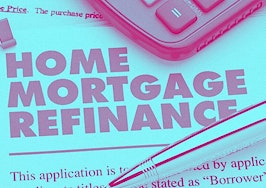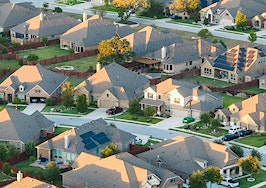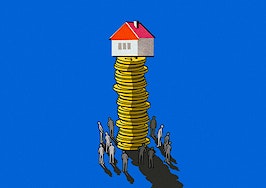The pandemic and the resulting economic upheaval have reignited fears about a 2007-esque housing market crash — complete with a drastic decrease in home values and prices, mass foreclosures and a depressing financial outlook for homeowners unable to stay afloat.
Although the common consensus says the average homeowner won’t face the same Great Recession fate thanks to a robust housing market with strong home price gains, chief economists George Ratiu, Mike Fratantoni and Edward Pinto told Inman there is a group of homeowners who are at risk of losing everything.
Homeowners with FHA loans are taking the brunt
Realtor.com Senior Economist George Ratiu told Inman the coronavirus-induced economic downturn has disproportionately affected homeowners with Federal Housing Administration (FHA) loans. These homeowners, he said, are usually first-time, minority homebuyers with lower incomes and/or unfavorable credit scores — all factors that put them at higher risk of unemployment and foreclosure.

George Ratiu
“When you look at the forbearance ratio for FHA, we can tell they’re actually significantly higher than conventional or those backed by Fannie and Freddie,” Ratiu explained. “In fact, depending on which data source you’re getting, the rate of forbearance for FHA loans is between 10 and 12 percent. It’s much higher than the roughly four to five percent on loans backed by Fannie and Freddie.”
Ratiu said he’s “not surprised” by the FHA default rate, as these homeowners usually work in the service, hospitality, retail, entertainment, and travel industries — the exact industries struggling the most to bounce back as Americans grapple with a new normal.
“[On Thursday], we saw data from the Bureau of Labor Statistics looking at the unemployment insurance claims,” Ratiu said. “They finally dropped under 1 million to 801,000, but that’s, historically speaking, a stratospheric level still. And the number of Americans drawing unemployment is well over 13 million.”
“We saw a spike in coronavirus cases in July and August,” Ratiu added. “We’re seeing a lot of schools as well as higher education colleges [and] universities still struggle with reopening. So all of this uncertainty is really what’s causing many companies and employers to be very cautious.”
Despite continuing struggles with unemployment and the coronavirus, Ratiu and Mortgage Bankers Association Chief Economist Mike Fratantoni still are cautiously optimistic about the economy’s trajectory, with both saying unemployment rates could level out to their pre-coronavirus levels sooner than we think.

Mike Frantantoni
“Our forecast is for the unemployment rate to drop to about 8 percent by the end of this year and 6 percent by the end of next year, and we expect that many people who had temporarily lost positions will be able to regain them as we try to work our way through this pandemic recovery,” Fratantoni said.
“From my perspective, having the unemployment rate drop from roughly 10 percent, where it is right now, closer to five or six percent, which is what historically, we would consider in a balanced and healthy environment, that would be a really strong signal that the economy is improving,” added Ratiu, who spoke to Inman on Thursday, before the unemployment rate dropped to 8.4 percent on Friday. “Can that be done in the next six months? The short answer is, I think yes.”
“Is it likely? That’s more debatable.”
Popular travel, entertainment destinations are at the greatest risk
For Ratiu and Fratantoni, their cautiousness lies in the economic outlook for cities whose economies depend on entertainment and hospitality, such as Las Vegas and New York City. In past years, homeowners in those cities could count on a holiday income boost as retailers prepared for gigantic sales and an influx of visitors.
“Generally, [winter is] the season when we see a nice spike in employment as the holiday shopping season tends to drive a lot of employment gains,” Ratiu explained. “The trouble there is we’ve seen a lot of retail companies go through bankruptcy proceedings as a result of this pandemic-induced recession.”

Edward Pinto
Beyond unemployment rates in the retail and entertainment industries, American Enterprise Institute Housing Director Edward Pinto told Inman another risk factor, outside of a city’s main economic driver, is simple: a high share of homeowners with FHA loans.
“One in six FHA loans is currently delinquent,” Pinto said in reference to AEI’s latest research. “There are these metros that we highlighted that have a relatively high percentage of delinquent loans — Atlanta has got 21 percent, which is above the national average of 17 percent.”
“It also has a pretty high share of FHA loans in its metro area, and so they’re doubly at risk, because they have higher default rates, and they have a higher propensity to have FHA loans,” he added.
Pinto’s research highlighted Atlanta, Houston, Riverside, California; Baltimore and San Antonio as the top five cities at greatest risk of experiencing a wave of FHA foreclosures in 2021, due to their current delinquency rates that reach as high as 21.6 percent.

AEI’s FHA delinquency chart.
Unlike the Great Recession, where cities experienced a broad housing collapse due to industry-wide risky lending practices, Pinto said this impending crisis will impact specific ZIP codes that have higher shares of low-income and minority homeowners.
“FHA, by definition, is for lower-income borrowers, and they lend much more to minority borrowers,” Pinto explained. “Therefore, these FHA loans are going to be concentrated among lower-income and minority borrowers.”
“We know that those lower-income minority borrowers are very much concentrated in very specific ZIP codes, so [FHA deliquencies] are going to impact specific ZIP codes,” he added.
Pinto said a wave of foreclosures could lead to blight in these ZIP codes, something that would exacerbate the lingering issues caused by the 2007-2008 housing crisis.
“You start getting foreclosures that concentrated in certain geographies in a ZIP code, that has an effect on other homes that are nearby,” he said. “Within, say, four or five blocks, you get a blighting effect from foreclosures, you get a blighting effect for deferred maintenance.”
“That starts creating a negative feedback loop that starts driving house prices down,” he added. “It’s so distressing and troubling that the same ZIP codes that got creamed in 2006 and 2007 and lost homes to foreclosures in 2008, 2009, 2010 and 2011 are going to get negatively impacted again this time.”
What can homeowners do before going to foreclosure?
Pinto, Ratiu and Fratantoni said there’s a thin, silver lining for homeowners who are facing the possibility of extending their forbearances or going into foreclosure — home price growth.
“Relative to the great financial crisis a decade ago, a real difference this time is that the housing market is quite strong,” Fratantoni said. “So for much of the past decade, we’ve seen home prices going up. In some ways too fast, right?”
“We had home prices increasing more than twice the rate of income growth, so [there’s been] a lot of affordability challenges and in many parts of the country,” he added. “But for someone who bought a few years ago, that has meant that they have considerable equity in their home, and if they found themselves no longer unable to afford their payments, given the shortage of inventory on the market, it’s likely they could probably sell their home fairly quickly if needed.”
If a homeowner is adamant about not selling, Pinto said there could be an opportunity for turning their home into a rental until their financial outlook improves.
“If a house can earn its way out of the mortgage, through rent, then you have a backstop,” he said.
Pinto said the median price for FHA-financed properties is nearing $200,000, which he said breaks down to approximately $14,000 a year in payments (principal, interest, taxes, mortgage insurance). Homeowners could attempt to rent their homes for anywhere between $1,200 and $1,400 — enough to cover the housing payments and other needs, such as repairs.
However, if a homeowner couldn’t garner a rent to cover the housing expenses, Pinto said it would be better to sell than try to hold on.
“If it’s only renting for $1,000, then your alternative is to walk away from it,” he said. “However, there are things that one could do to try to reduce the risk of being in this high-risk situation.”
Finally, Ratiu suggested homeowners speak with their lenders about shifting the forborne payments to the backside of the loan term or negotiating a new loan term or payment schedule. He also suggested homeowners learn about the foreclosure procedures in their state to figure out how much time they have to find a solution.
“There is a process that a homeowner would go through in case of delinquency. You can be 30 days, 60 days or 90 days delinquent,” he explained. “Depending on the state, and this varies state to state, lenders have varying periods to initiate foreclosure proceedings.
“In some states it can be as short as 60 days. In others, it’s significantly longer,” he added.
The road forward for homeowners with foreclosures
However, some homeowners won’t be able to sell their homes, making foreclosure the only way out. All three economists said this option makes it harder for homeowners to reenter the market due to the negative credit impact.
“It takes time [to reenter homeownership] because once you have a foreclosure on your record your credit record, it probably takes five or six years [to come off],” Pinto said. “That’s the time just to get your credit back to a mid level, you know, in the 600-range. It takes time.”
Pinto said this creates a negative loop for low-income and minority homeowners, who are the “last in and first pushed out” when it comes to housing booms and busts.
For example, Pinto said these homebuyers spent nearly 10 years repairing their credit and attempting to earn higher incomes after the Great Recession, meaning they missed the opportunity to buy homes at a lower price and build equity during the price boom.
“One of the reasons that low income and minority buyers have a lower homeownership rate, and as a group can’t sort of thrive in owning homes, is because they tend to get into the cycle late and so late in the cycle, which started in 2012,” he explained. “So late would be 2017, 2018, 2019, 2020.”
“We know that the minority homeownership rate has been picking up slowly but it’s been picking up in the last few years,” he added. “But they tend to be the ones that go to foreclosure or have to sell under stress relatively soon when the market turns, and if that’s the case, it’s very hard for those individuals to actually build wealth owning a home.”
“And they’re, you know, owning a home for only four or five, six years, and then they’re out of the cycle again, for five or six years while they try to recover from the foreclosure and everything else that happened to them,” he continued. “And then they get in late, the next cycle and then the same thing happens time and time again.”
With this in mind, Pinto said homebuyers eyeing an FHA loan should hold off on homeownership until they’re in a better financial situation or consider another loan option that could fit their needs.
“[Buying a home] is tough to do and if you can’t do it, we suggest you stay out of the market so that you don’t take one of these high-risk loans,” he explained. “It’s not doing anyone a favor, putting them in a home with virtually no money down, a 30-year term, a 50 to 55 percent debt to income ratio, and a credit score of 640 or 650, or 660, or 670.”
On the other hand, Ratiu said he believes the benefits of the FHA loan ultimately outweigh the risks.
“[From low-risk loans], we obviously have a continuum or at least a range where we go down towards the riskier borrowers,” he said. “There are those who have lower FICO scores, or sometimes they have great FICO scores, but don’t have a 20 percent down payment.”
“And so, anywhere in that continuum or combination of FICO scores, downpayment, incomes, you can have a great income, but have a low FICO score because you weren’t careful when you’re younger,” he added. “In that regard, we can say that perhaps some FHA loans might be riskier.”
He continued, “I would say that, in a sense, all lenders are doing are trying to answer a market need, there are obviously people who have varying combinations of those factors. However, lenders obviously price for all these factors.”
As far as the benefits, Ratiu said homeownership is a path to stability, better familial and longterm financial outcomes, and FHA loans provide those who’d be locked out of homeownership with a way in.
“I would say that this is very much a viable and important solution or alternative for many borrowers who might not meet the traditional standards to access a mortgage and be able to buy a home,” he said. “If we really take sort of a broader picture approach, when we think about the benefits that homeownership has traditionally brought more stability.”













